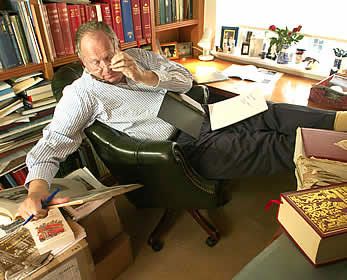Dead Lines
Today’s obituary writers sum up lives famous and not with pans as well as paeans
/https://tf-cmsv2-smithsonianmag-media.s3.amazonaws.com/filer/obituaries_stones.jpg)
"Anyone who has ever hammered a nail into his nose owes a large debt to Melvin Burkhart."
Did someone ask, "O death, where is thy sting?" It is in residence on the obituaries desk at London's Daily Telegraph. In the past, most newspapers believed obituaries should be short, dutiful and dull. The obits desk was the Siberia where failing hacks got banished in their dotage and young reporters learned the importance of being polite and spelling peoples' names correctly. But over the past 15 years, led by the revolutionaries of death at the Telegraph, the obituary has quietly blossomed.
Newfangled obits often display a malicious wit. The Telegraph, for example, once remembered an Australian politician "for his keenness to enter beer-belly competitions, his habit of stirring his tea with his finger, and his regular nomination as one of Australia's worst-dressed men." The lives being commemorated, too, are not necessarily newsworthy by traditional standards, though they are frequently colorful. The Denver Post recently marked the passing of a tree-trimmer nicknamed Redneck, given to drinking Jack Daniels, spray-painting rocks and singing Elvis Presley's hit "Suspicious Minds" in the treetops. Poignant details abound: A Telegraph obituary of a pioneering aviator noted, for instance, that she flew a single-engine De Havilland Puss Moth upholstered by her mother in the same colors that had once adorned her baby carriage.
Creating the Telegraph's obituary page was Hugh Massingberd's dream job. The obituary style he introduced was modeled on the 17th-century antiquarian John Aubrey, whose Brief Lives was chock-full of trivial details and unguarded glimpses of the people he profiled. Massingberd also credits the style to Jeeves, the butler in P.G. Wodehouse's comic novels of the British aristocracy. It is typically detached and utterly deadpan, the straightforward delivery of biographical fact allowing bizarre details to rise without warning, as Massingberd characterizes it, from a "sea of dullness." The obituary of Col. Frank "Monocle" Morgan, for example dutifully recounted his work establishing telephone communications in the tranches during World War I. It also noted that he could eject his monocle "by jerking his head upwards, and then catch it again in the socket. He said he found this a useful trick when addressing restive or sleepy audiences."

/https://tf-cmsv2-smithsonianmag-media.s3.amazonaws.com/accounts/headshot/richard-conniff-240.jpg)
/https://tf-cmsv2-smithsonianmag-media.s3.amazonaws.com/accounts/headshot/richard-conniff-240.jpg)